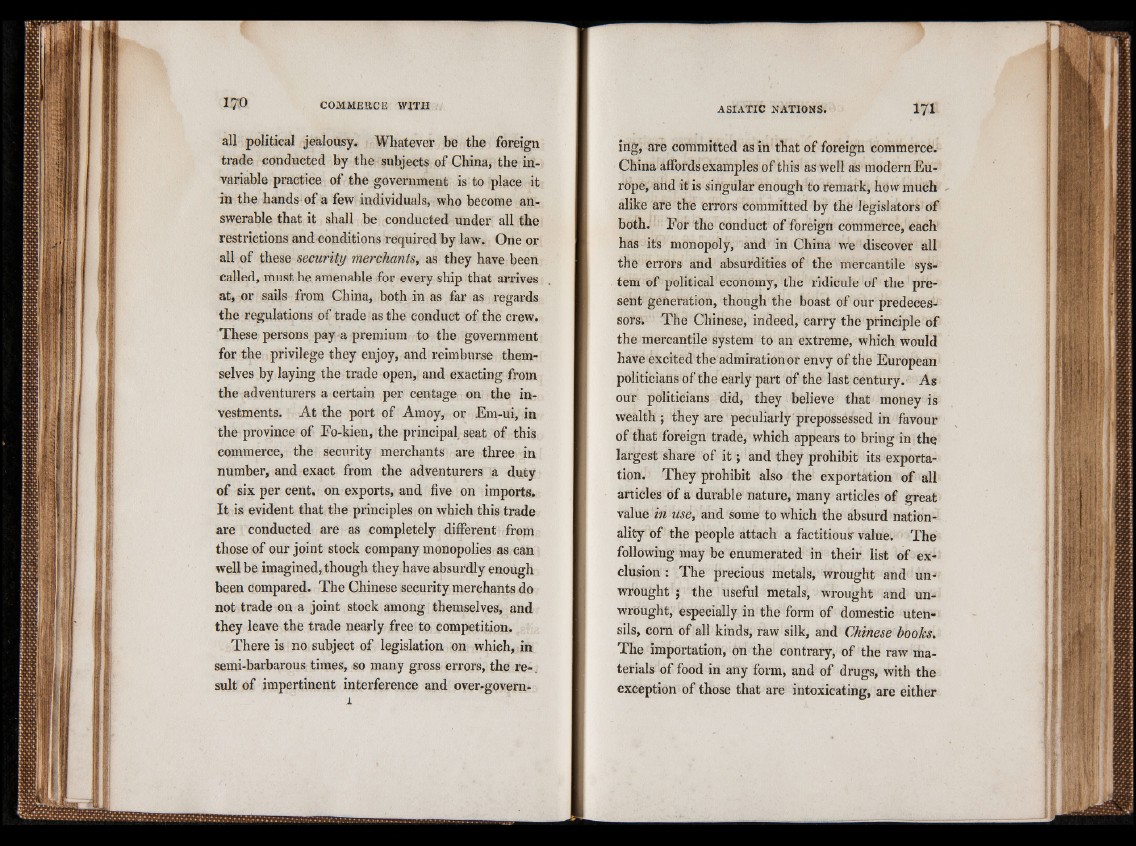
all political jealousy. Whatever be the foreign
trade conducted by the subjects of China, the invariable
practice of the government is to place it
in the hands of a few individuals, who become answerable
that it shall be conducted under all the
restrictions and conditions required by law. One or
all of these security merchants, as they have been
called, must be amenable for every ship that arrives
at, or sails from China, both in as far as regards
the regulations of trade as the conduct of the crew.
These persons pay a premium to the government
for the privilege they enjoy, and reimburse themselves
by laying the trade open, and exacting from
the adventurers a certain per centage on the investments.
A t the port of Amoy, or Em-ui, in
the province of Fo-kien, the principal seat of this
commerce, the security merchants are three in
number, and exact from the adventurers a duty
of six per cent, on exports, and five on imports.
It is evident that the principles on which this trade
are conducted are as completely different frojn
those of our joint stock company monopolies as can
well be imagined, though they have absurdly enough
been compared. The Chinese security merchants do
not trade on a joint stock among themselves, and
they leave the trade nearly free to competition.
There is no subject of legislation on which, in
semi-barbarous times, so many gross errors, the re-,
suit of impertinent interference and over-govern*
ing, are committed as in that of foreign commerce.
China affords examples of this as well as modern Europe,
aiid it is singular enough to remark, how much
alike are the errors committed by the legislators of
both. For the conduct of foreign commerce, each
has its monopoly, and in China we discover all
the errors and absurdities of the mercantile system
of political economy, the ridicule of the present
generation, though the boast of our predecessors.
The Chinese, indeed, carry the principle of
the mercantile system to an extreme, which would
have excited the admiration or envy of the European
politicians of the early part of the last century. As
our politicians did, they believe that money is
wealth ; they are peculiarly prepossessed in favour
of that foreign trade, which appears to bring in the
largest share of i t ; and they prohibit its exportation.
They prohibit also the exportation of all
articles of a durable nature, many articles of great
value in use, and some to which the absurd nationality
of the people attach a factitious' value. The
following may be enumerated in their list of exclusion:
The precious metals, wrought and unwrought
; the useful metals, wrought and unwrought,
especially in the form of domestic utensils,
com of all kinds, raw silk, and Chinese books.
The importation, on the contrary, of the raw materials
of food in any form, and of drugs, with the
exception of those that are intoxicating, are either